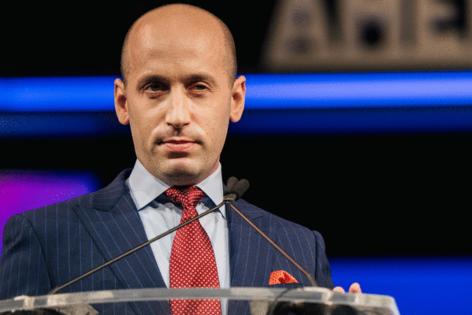Miller, Trump immigration hard-liner, wants mass deportations. He may undermine them instead
Published in News & Features
President-elect Donald Trump named Stephen Miller, a longtime confidante and vocal opponent of immigration and asylum, as his next deputy White House chief of staff for policy on Monday, furthering his plans to fulfill a key campaign promise to conduct mass deportations of immigrants out of the United States.
But Miller’s own policy proposals may undermine those plans from the start.
Miller has repeatedly railed against a program that became a linchpin in the Biden administration’s strategy to slow a historic flow of migrants to the U.S. southern border and convince Mexico to accept up to 30,000 deportees a month – a critical diplomatic breakthrough that increased the capacity of U.S. authorities to deport people from Cuba, Nicaragua, Venezuela, and Haiti that previously did not exist.
These four countries have represented some of the biggest sources of immigration to the United States in recent years – and either have governments hostile to Washington, often unwilling to accept deportation flights, or are in a state of chaos, unable to reliably accept them.
Only by creating new, legal pathways for migrants to enter was the Biden administration able to convince Mexico to accept deportees, an aim the Department of Homeland Security had held for years, according to court records. Eliminating those legal pathways could ultimately undermine the ability of the U.S. government to conduct tens of thousands of deportations a month to its southern neighbor.
“Mexico has made clear that its willingness to accept returns of [nationals from Cuba, Nicaragua, Haiti, and Venezuela] to Mexico is contingent on the continued availability of lawful processes for nationals from those countries to come directly to the United States,” the agency said last year in documents submitted as part of a federal lawsuit.
“If DHS cannot provide lawful processes for some nationals [of those countries] to come directly to the United States,” it continued, “Mexico will almost certainly stop accepting returns or removals of nationals [of those countries] at the southwest border.”
‘Fast-pass for illegal aliens’
The parole program has allowed over half a million people from these countries to temporarily come to the United States through legal means, as long as they had a U.S. financial sponsor and underwent U.S. government vetting. When the federal government expanded the program in January 2023, it also announced it would increase the use of expedited deportations and restrict access to asylum.
The Biden administration first launched the program for Venezuela in October 2022 and later expanded it to Cuba, Nicaragua, and Haiti three months later. Over 110,000 Cubans, almost 211,000 Haitians, over 93,000 Nicaraguans, or more than 117,000 Venezuelans have flown to the United States through the program, according to federal government data.
Miller has been highly critical of the widely publicized program, stating it has “secretly flown nearly half a million illegals” into the United States and characterizing the effort as “one of the gravest criminal acts in American history.”
“CHNV is the federal government acronym for the migrant flights of illegals into Small Town USA,” Miller wrote on the X platform, formerly known as Twitter, in September. “The H stands for Haiti.”
“What is the CBP One App? It’s Kamala’s fast-pass entry program for illegal aliens,” Miller wrote last month, referring to Trump’s election opponent, Vice President Kamala Harris.
“Arrive at border without a visa. Press button on a smart phone. Entry on demand. 95% acceptance rate for all illegals,” he wrote. “Take American jobs.”
No renewals for current beneficiaries
Anticipating a potential transfer of power to Republican hands, the Biden administration confirmed last month that it was not planning on renewing paroles for existing beneficiaries, giving those currently under the program time to prepare and pursue other legal pathways to remain in the country. Those individuals will have to either find another way to stay in the United States or leave the country altogether.
Many Venezuelans and Haitians that arrived through the program are eligible for Temporary Protected Status, which protects people from countries in turmoil from deportations. No Nicaraguans who have arrived under the program are eligible for their country’s TPS, which was last designated at the turn of the century. Meanwhile, Cubans can apply for a green card after a year and one day of being admitted or paroled into the U.S. because of a decades-old legislation.
The specter of the incoming administration also makes the future of Temporary Protected Status uncertain. Trump previously moved to end the program for several countries, including Haiti and Nicaragua, during his last administration. During his campaign, he said his administration would end Temporary Protected Status for Haiti again. And many newly arrived Cubans are struggling to legalize already because they are not eligible for green cards under the Cuban Adjustment Act because of the paperwork they were given at the border.
America First Legal, Miller’s aggressively conservative legal group, along with 20 Republican-led states, filed a lawsuit to terminate the Biden parole process in April 2024. The legal challenge came months after a federal judge in Texas dismissed a lawsuit where Florida, Texas, and several other states requested the program be deemed unlawful. At the time, Miller described the program as a “clandestine migrant smuggling operation.”
“It is a covert plan to resettle our communities, and we will use every legal tool we have to oppose it,” said Miller in a statement.
©2024 Miami Herald. Visit at miamiherald.com. Distributed by Tribune Content Agency, LLC.







Comments